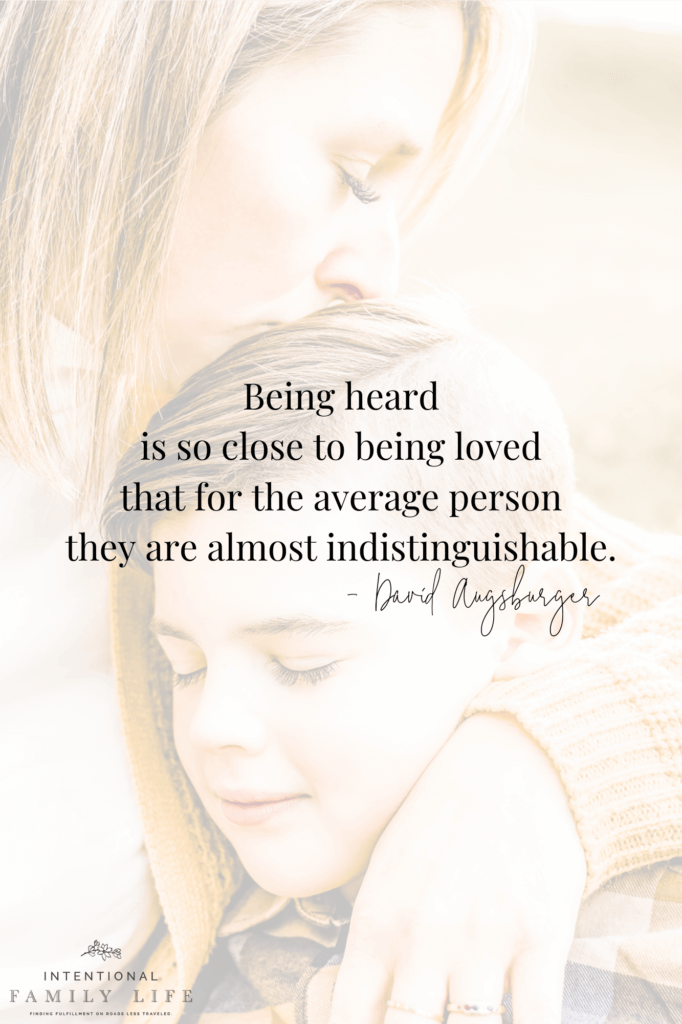Spoiler Alert: Tweens and young people in middle school are experiencing unheard of levels of stress. And much of it is school stress. Feelings of stress can be completely normal at this age – so much is changing since they were in early elementary school – including changing hormones. But children this age can also fall victim to dangerous chronic stress. As parents, we have the ability to contribute to their mental health support system. Here, I’ll show you five of techniques that have been the most effective for us in reducing school stress (yes, there’s school stress even though we homeschool!)

Who Is Suffering From School Stress?
The answer might come as a complete surprise to you:
Almost 40 percent of parents say their high-schooler is experiencing a lot of stress from school, according to a new NPR poll conducted with the Robert Wood Johnson Foundation and the Harvard School of Public Health. In most cases, that stress is from academics…
and…nearly half of all teens — 45 percent — said they were stressed by school pressures.
Stress Takes a Toll On Health
A headmaster at a local Atlanta private school elaborates on school stress:
Call it pressure. Call it great expectations. Whatever its name the result is the same: school stress.
It starts as soon as kindergarten. It turns play into competitive sport. It turns the joy of learning into a struggle to excel. It turns friends into social connections and charitable acts into a line on a resume.
Students are put in a position of feeling they just must not stop. They are not given a sense of support. They are put in an environment where they are not accepted for themselves but only for what they are going to achieve. All this builds stress.
School Stress Starts Early
Signs That Your Tween May Be Under Too Much Stress

Be On The Lookout For Any Of These Behaviors That Are Out of Character
- difficulty concentrating or finding motivation
- irritability or moodiness (that is out of character)
- unexplained changes in school performance
- withdrawing from friends or activities that they previously enjoyed
- trouble sleeping, sleeping more or less than usual
- tense muscles, headaches, a tight jaw, teeth-grinding, a racing heart, stomach aches, sweaty palms, or trips to the school nurse
- feeling tired, exhausted, or overwhelmed
- eating more or less than usual
If you notice any of these signs in your child, pay close attention and start to implement stress reduction strategies with your child. Make these strategies and changes a family affair so that your child doesn’t feel odd or alienated.
It’s important to normalize school stress for your child and to help her understand that we all experience stress. What is important is not that we are experiencing stress, but how we cope with that stress.
As parents, we can teach our tweens stress reduction strategies that will become lifetime habits.
Remember that stress reduction strategies are strategies and techniques to incorporate into your lifestyle that will help you reduce your susceptibility to stress, and in this case school stress.
Stress reduction strategies aren’t the same as stress management techniques. Stress management techniques help you move through the actual moment of stress. For example, helping your tween get through a test or important try out at school.

Reflective Listening Can Help Reduce School Stress
In any situation, it helps to observe your child’s behavior as the expression (potentially the inappropriate expression) of a big emotion. Try to figure out the emotion being expressed – anger? frustration? embarrassment? (connect with kids through reflective listening)
Once you see what emotion(s) your child may be feeling, you can then empathize and ask child-centered questions. “Hey, it looks like you’re really frustrated about something. Is there something I can do to help?”
I call the next few steps: being a “Starbuck’s parent.” It’s nothing like a helicopter parent, or a soccer mom, or any other name-calling du jour levied agains parents these days.
It’s much more like going to Starbuck’s. Let me explain.
You know how when you go to Starbuck’s they always read your order back to you very precisely? They may also even ask you to look at the screen and confirm that what you see there is correct.
SB: “So, this is what I have: one grande vanilla latte, and one plain bagel – toasted with cream cheese. Is that correct?”
You: “Yes, but I wanted butter instead of cream cheese with that bagel.”
SB: “Ok, I’m sorry. So I have you for one grande vanilla latte, and one plain bagel – toasted with butter. Is that correct?”
You: “Yes.”
Reflective Listening Checklist:
Tweens and teens want us to not only listen, but to hear what they are telling us. This listening technique allows us to convey that we have heard them.
Now before you begin to panic, it doesn’t mean we agree with them.
It doesn’t mean that their behavior was appropriate or that it won’t need to be different in the future.
It only means that we accurately heard and understood what they said.
You can always use these conversations as a jumping off point to teach tweens about appropriate ways to express their big emotions as well as how to be polite and respectful.
And what if you get the dreaded – “But you can’t possibly understand.” There can be times that no matter how good our reflective listening, they still don’t think that we understand the problems. But, I’ve found that this technique to understand tweens frequently works for those situations.
And, this is the perfect solution if you find yourself in a sticky or awkward conversation with your tween that you were simply unprepared for.

Create A Stable, Consistent, & Dependable Home
The tween years were hard on me and I’m certain that it wasn’t just me. The tween years feel like trying to navigate Class V white water rapids when you barely know how to swim – and that goes for parents too!
But think about this from your child’s perspective. Never, maybe since the toddler years, has so much in their lives been this uncertain and unreliable.
Their bodies are changing and unreliable. For boys, even their voices become untrustworthy and potential sources of betrayal and humiliation at any given minute.
The rules of interacting with friends are changing – “Does she like me like me – or just like me?” For others, budding same-sex attractions are confusing and maybe even frightening.
Social networks are growing and becoming more complex to navigate. The drive to “fit in” and “fly under the radar” can be strong.
Academic expectations are increasing. The pressure to get into college or decide what you want to do is increasing. Building a portfolio of activities for college is important. This all adds up to increased school stress.

Social media is ever present; so the consequences of making an age appropriate “mistake” or “bad choice” could be huge and embarrassing.
There are always those kids who are seeking to leverage any little slip up to their advantage. “Bullies.”
Because everything “out there” is constantly shifting underneath their feet, tweens need a stable place that is reliable – home. This is one of the ways that we maintain a more stable, reliable home for our kids to return to.
So no matter what else is going on, do your best to stick to your routines; hold your boundries; or continue having family dinners – even when they complain. I might even advise especially when they complain.
Whatever your family routines are, work hard to maintain them.
Our tweens need to know we are there when they succeed as well as when they fail. We are there when they want us to be as well as when they may prefer spending time with friends. We are here – and we will hold space and walk quietly through the school stress with them.
This is the best explanation I’ve heard about why maintaining stability, balance and routines is so important in order to support our tweens and teens:
Mindfulness / Breaks
Mindfulness, in simple terms, is the state of being conscious of something and focusing your awareness on the present moment. When you’re practicing mindfulness, you’re calmly aware of your thoughts and feelings. Mindfulness, as a practice, isn’t just for adults. Children and teens can benefit from it as well.
Big Life Journal
I’m going to be real with you. We are (and by “we are” I mean “I am”) still working really hard on this – it’s not something that my boys have taken to – and I’m not sure why. Because – Lord hear my prayers – I know these boys need a little bit of mindfulness!
I was worried that the boys thought mindfulness was “for girls.” But we’ve discussed it and the reasons they might feel that way, so I don’t think that’s it.
Maybe it feels too “woo woo” for them.

But what I believe is that it’s really challenging for them to quiet their minds in such a noisy world. It’s something they have to focus so much attention on, that it’s exhausting.
So I keep on keepin’ on. And I know that it will pay off.
If there’s anything that I know, I know that today’s world is overwhelmed by stress (including school stress); distractions; intensity – you name it. So many things that take us away from our own inner voice. And I suspect that these distractions will only increase as my boys get older.
Also, remember, so many of our tweens like particular activities because they think they are “supposed” to like certain things at this age. But that may not always be the case.
Allow them the opportunity to enjoy activities that you may think are “too young” for them. You might just be surprised – when they have already mastered something – it can be wonderful to just play without the stress of performing at a certain level!
Familiar activities that they enjoy and have mastered can be the perfect break from an overload of school stress.
Spend Time Together
Spending time together can be difficult during these years. Because, let’s face it, our tweens and teens don’t always want to hang out with us. It’s all about the friends. They want to hang out with their friends.
But here’s the thing. If you don’t insist that you continue certain family time together – you will forego any opportunity for conversation, connection, and an understanding of what is happening in their world. You may need to change up what you do during that time – and that’s fine. But don’t let go of the time.
Ways to Be Present Every Day With Your Kids
Grab the Cheat Sheet!
Does spending one on one time with each of your kids feel overwhelming?
Let me help make it feel easy and simple with tons of easily actionable – do it now – ideas for quality time.
“With teens, it is like pulling teeth to get them to talk. They just want to talk to friends,” DeBord notes. “Finding time to talk with teens may mean going to the mall with them. Or lying down on the pillow next to them at bedtime. Find times when they can open up. Figure out how to open those conversations.”
Bryant says it’s a myth that teens can’t have good relationships with their parents. Both DeBord and she insist that it’s crucial for adolescents to be able to talk with adults.
Want A Fun Way To Learn More About What’s Going On In Your Tween’s Life?
“What they will want to talk about will surprise you,” DeBord says. “It is heavy stuff — family problems, sexuality, world peace. It could be that what’s weighing on their minds is much heavier than what we think they want to discuss.”
Teens are desperate to maintain good relationships with their peers — but they also don’t want to goof up, Bryant says.
“Stay with it in a kind, supportive way,” she advises. “Express confidence that they can still carry their load at home. There is no quick, easy solution. Parenting in adolescence is more time-consuming than in elementary school. They need us there with clear boundaries. They need our lives to be stable and, to them, even boring. It says to them, ‘As you go have your adventures, we are stable here.'”
Don’t Expect From Them That Which You Don’t Expect From Yourself
And finally, you know the expression that animals can “smell your fear?”
Well, if you haven’t witnessed this for yourself already – our kids are experts at sniffing our hypocrisy.
And this is an important underpinning for successful communication and trust between you and your soon to be adult child. You cannot ask of them things that you do not do yourself.
For example, are you frustrated when your children don’t look up from their devices to speak to you? Look at your behavior first. What do you do with your phone when your kids come in the room?
If you say, “Let me just finish this text first…” or “I’m finishing today’s WORDLE…” then how can you expect your kids to understand the importance of putting their devices down when other people are around?
What happens when you or your partner come home from work? Do you immediately sit down and continue working? Not typically. We usually want to unwind, relax, talk to friends and family, have something to eat, or whatever relaxes us and “washes the day away.”
And then, let’s face it, many of us don’t work any more until the next day.
Yet, we expect often expect our kids to get their homework done first, before they can play.
It’s harder to get buy-in from the kids when we are doing things that wouldn’t meet our own expectations of them.
So allow me to suggest a conversation. Let them share their need to “let down” after a stressful day at school. Empathize with that and set up a schedule that allows them to have down time, yet schedules in time to complete homework and other responsibilities.
Don’t Forget To Pin This So You Can Come Back Later!










